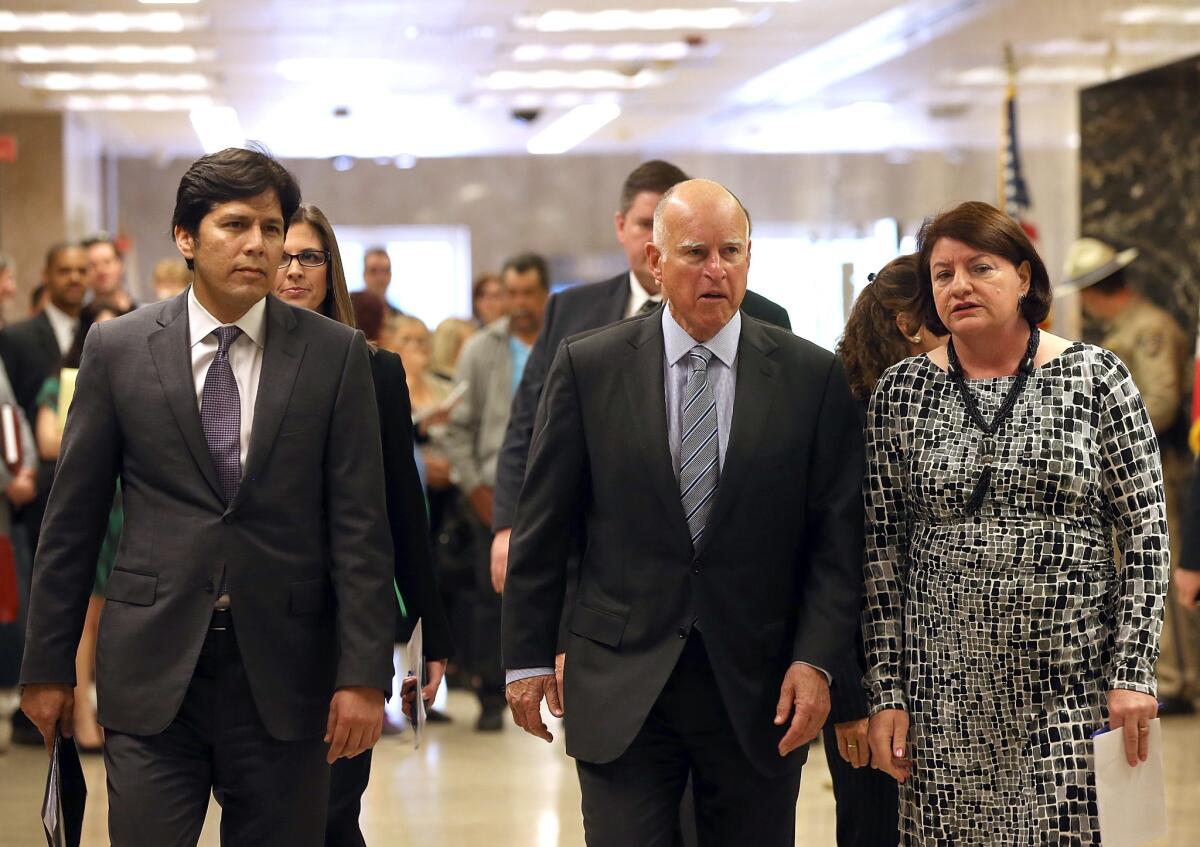Legislature approves new $117.5-billion budget as spending talks continue

Senate leader Kevin de Leon (D-Los Angeles), left, and Assembly Speaker Toni Atkins (D-San Diego), right, are pushing a new budget that includes more spending than Gov. Jerry Brown wants.
- Share via
Reporting from Sacramento — California lawmakers passed a new budget Monday, but the debate over state spending is far from over in the Capitol.
Shortly after the approval of a $117.5-billion general fund, legislative leaders returned to negotiations with Gov. Jerry Brown in an attempt to reach a final deal.
“We’re close,” said Assembly Speaker Toni Atkins (D-San Diego).
Lawmakers’ pay would have been docked had they not passed a budget by midnight. But the plan they approved is $2.2 billion larger than what Brown proposed, and the governor has repeatedly expressed concern that the Legislature’s ruling Democrats want to spend too much.
Based on higher revenue estimates than Brown accepts, Democrats added extra money to restore healthcare benefits cut during the recession, expand state-subsidized child care, pay more to doctors who serve poor patients and boost funds for public universities.
That funding remains in doubt as talks continue.
Brown has held the upper hand in budget negotiations in recent years, persuading lawmakers to pare their spending plans and employ more restrained revenue estimates. But state income has outpaced his projections, and on Monday some Democrats appeared ready to dig in their heels.
“This is not rule by fiat,” Senate leader Kevin de León (D-Los Angeles) said. “This not a monarchy.”
A new budget is required by July 1, the beginning of the new fiscal year, and the next steps are unclear.
Negotiations with Brown could produce new legislation for lawmakers to approve in coming days. Or the governor could use his veto power to strip from the Legislature’s plan any spending that he dislikes.
Brown declined to say what he’s planning.
“No, I can’t tell you that, because we’re in conversation with the Legislature, as you type, discussing these various matters,” he said at a Los Angeles news conference on climate change Monday morning.
Democrats would need help from Republicans to override any Brown vetoes, and GOP lawmakers are unlikely to provide it. Even though they supported some individual spending proposals, Republicans harshly criticized the approved budget as unsustainable.
“We can’t stay the course,” said Sen. John Moorlach (R-Costa Mesa). “It will lead to a fiscal implosion.”
The Democrats’ plan relies on revenue estimates that are roughly $3 billion higher than those used by the Brown administration. Much of that money would be allocated under California law to schools and community colleges, the state’s rainy-day fund or debt repayment.
That leaves $749 million in discretionary spending for increased government services.
In a budget as big as California’s, that’s “a rounding error,” said Senate Budget Chairman Mark Leno (D-San Francisco). “But we use that rounding error to benefit Californians who are still struggling.”
Among other changes, the Democrats’ budget would eliminate restrictions that deny additional benefits to women who give birth while already receiving welfare. The change would cost $103 million in the next budget and potentially double that amount in future years.
Besides negotiating aid to the poor, more work needs to be done on other areas of the budget.
The governor and lawmakers have postponed the debate over how to use some revenue from the state’s cap-and-trade program, which charges fees to polluters.
About 60% of the revenue will be directed to the state bullet train project, affordable housing and other transportation programs. But the remaining 40% — almost $900 million — has not been allocated.
State law requires the money to be used to reduce greenhouse gas emissions. Brown wanted some of it for energy efficiency projects and drought relief; Republicans have sought to use it for road repairs.
Some far-reaching policy issues also remain unsettled.
Thousands of workers who provide state-subsidized child care would be permitted to unionize under the Democrats’ plan — a potentially significant victory for organized labor.
Brown vetoed similar legislation in 2011, saying it would have increased taxpayer costs.
In addition, the governor is pushing a budget-related proposal that would allow the state to require local water agencies to consolidate if they failed to provide adequate access to clean drinking water.
The Assn. of California Water Agencies and other organizations representing local governments oppose that legislation, saying such a change is unnecessary and too broad.
Atkins declined to say whether lawmakers support the proposal.
“We’re still in discussion,” she said.
Twitter: @chrismegerian
Times staff writers Michael Finnegan in Los Angeles and Melanie Mason and Patrick McGreevy in Sacramento contributed to this report.
Follow @chrismegerian for more updates from Sacramento.
More to Read
Sign up for Essential California
The most important California stories and recommendations in your inbox every morning.
You may occasionally receive promotional content from the Los Angeles Times.











